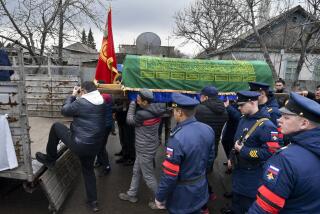Peace Corps Volunteers Teach Russians the Rudiments of Capitalism : Economics: Years of communism left many lacking business skills. The group’s goal is to set up centers to counsel budding entrepreneurs.
- Share via
Joan Masters never thought she would see a non-communist Russia. Now the 66-year-old Chicago businesswoman, a teen-ager when the Iron Curtain went up, is packing her bags for Moscow--to teach Russians how to be capitalists.
Masters has joined a growing cadre of Peace Corps volunteers who are exporting Yankee business skills to people whose exposure to free enterprise has been limited to books, anti-capitalist tirades and, increasingly, to an explosion of speculation and price-gouging across Russia.
“The minute I heard about the failure of communism, I felt I could help those people,” said Masters, who for the last 22 years has operated her own secretarial-services company.
“I can help because I started a business from nothing,” she said, “and I know they have nothing to start with.”
The Peace Corps, which goes into countries only by formal invitation of a host government, already has volunteers in Poland, Romania, Czechoslovakia, Hungary and Bulgaria. Officials announced plans to enter Russia last New Year’s Eve, the final day of the Soviet Union.
Current plans call for 250 volunteers in Russia and five other former Soviet republics--Ukraine, Armenia, Uzbekistan, Kazakhstan and Moldova--by the end of 1992, and another 250 in 1993. Sixty volunteers already are serving in the Baltic nations of Lithuania, Latvia and Estonia.
The goal is to set up enterprise development centers where small-business operators can receive counseling on such subjects as marketing, bookkeeping, planning, management, credit and banking. Roaming volunteers will assist business projects in other regions.
“Right now, just sending money to help the former Soviet republics isn’t the only answer,” Peace Corps Director Elaine Chao said. “Our volunteers are precisely what is needed, because they go out into the country, at the grass-roots level, and actually transfer information and skills.”
Thousands of Americans have responded to Chao’s announcement of the planned Peace Corps presence in the former Soviet Union. Officials report that calls from prospective volunteers shot up from 250 a day last year to the current 1,400 calls a day. Seventy percent of the callers want to know more about going to a previously communist country.
Former Iron Curtain countries also are proving popular with the volunteers already there. Volunteers serve two years, with an option to extend for a third year. One of every four volunteers in Poland requests the extension, compared to a worldwide average of 8%.
“Americans read about Russia and the other former republics on the front pages of their newspapers, they see the suffering, they see history in the making, and I think they’re naturally touched,” Chao said. “They want to reach out, to help, to make a difference and participate in shaping world history.”
Sending capitalist mentors to former bastions of communism marks a sharp turn for the Peace Corps. Although Sargent Shriver, its first director, always advocated offering services to communist countries, they were never requested.
Since its beginnings in 1961, the Peace Corps has focused on such things as teaching English and building irrigation projects in developing countries. About 6,000 Peace Corps volunteers now serve in 87 countries, mostly in Africa and Latin America.
Today’s average volunteer is older--39, compared to 23 in 1961. Ten percent are over 50. Those going to Russia are expected to have advanced university degrees and five to 10 years of business experience.
Women now account for 58% of volunteers, compared to 33% in 1963. The ratio of minorities has risen from 4% in 1963 to 12% now.
Competition for Peace Corps assignments is keen, especially with the emphasis on higher levels of training and experience. The application and screening process can take as long as two years although efforts are being made to shorten that period.
Once volunteers are selected, they receive three months of language, cultural and other training in the host country before assignment. They are given medical benefits, housing and stipends that allow them to live at about the same level as people doing similar work in the host country.
Joan Masters’ group of 100 will assemble in Washington in mid-November for several days of briefings and other preparation, and then begin training in Russia. Some will then proceed to assignments in the Volga River region, and others in Vladivostok, Russia’s main Pacific seaport, nine time zones beyond Moscow.
Masters is not dismayed by reports of hardships in Russia, including cramped housing and food shortages.
“I’m a good cook and housekeeper,” she said. “If I can just find some carrots, beets, potatoes, fish and occasional meat, that will be fine with me.”
More to Read
Sign up for Essential California
The most important California stories and recommendations in your inbox every morning.
You may occasionally receive promotional content from the Los Angeles Times.










